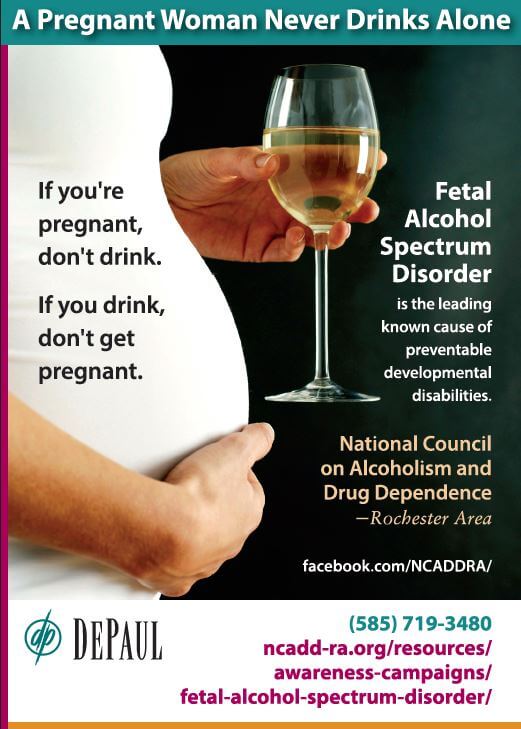Possible Effects of Alcohol and Other Drugs During Pregnancy
By: Jennifer Faringer, MS Ed, CPP-G, Director of DePaul’s National Council on Alcoholism and Drug Dependence-Rochester Area
September is Fetal Alcohol Spectrum Disorders (FASD) Awareness Month. Every mother hopes to deliver a healthy baby. While many women know that drinking during pregnancy can potentially cause harm, they may not fully understand the scope of potential developmental disabilities that might occur. Stigma and discrimination associated with addiction may cause women who wish to eliminate alcohol to avoid seeking treatment. It is crucial that prenatal care include an active conversation, as early in the pregnancy as possible, about the importance of eliminating the use of alcohol, tobacco, and other drugs during pregnancy.

In one study published in the Alcoholism: Clinical and Experimental Research Journal, researchers found that women, when asked about their alcohol use, often underreported both the amount and the frequency of use. The study found that 20 percent reported drinking during special occasions, and 52 percent reported binge drinking the last time they consumed alcohol. When asked about the number of drinks consumed, they acknowledged four or more. Screening tools most often used are more effective in detecting heavy chronic drinking but are less effective in detecting moderate or binge drinking episodes.
For that reason, both pregnant women and women intending to become pregnant are advised to abstain from alcohol, tobacco, and other drug use to ensure the safest, healthiest outcome for their pregnancy.
The table below illustrates impact of use during pregnancy that varies depending upon the drug. [Source: Institute for Health & Recovery, 2021]
| Alcohol | Tobacco | Opioids | Meth | Cocaine | Marijuana | PCP | |
| Growth deficiency | X | X | X | X | X | X | X |
| Behavioral problems | X | X | X | X | X | X | X |
| Cognitive problems | X | X | X | X | X | X | |
| Motor deficits | X | X | X | X | |||
| Developmental delays | X | X | X | ||||
| Facial anomalies | X | X | |||||
| Physical deficits | X | X | X | X | X |
[Meth refers to Methamphetamine. PCP refers to Phencyclidine.]
The above table clearly supports the statement made decades ago by the Institute of Medicine in their Report to Congress in 1996.
“Of all the substances of abuse (including cocaine, heroin, and marijuana), alcohol produces by far the most serious neurobehavioral effects in the fetus.”
To ensure the health and safety of your child, consider eliminating the use of alcohol, tobacco and other drugs during your pregnancy. If you are thinking about becoming pregnant, consider taking steps to begin to eliminate the use of alcohol, tobacco and other drugs.
To schedule a presentation for your school staff or community group, contact Jennifer Faringer at [email protected] or call (585) 719-3480. Visit the NCADD-RA’s website at www.ncadd-ra.org /resources/awareness-campaigns/fetal-alcohol-spectrum-disorder/ for FASD education, intervention and diagnostic resources.
For more information on recovery services in Monroe County and the Finger Lakes region, visit https://ncadd-ra.org/resources/information-referral/.
More information on FASD and other substance use and mental health topics may be found on the NCADD-RA’s Facebook page at http://www.facebook.com/NCADDRA/.
Remember, “A Pregnant Woman Never Drinks Alone.”